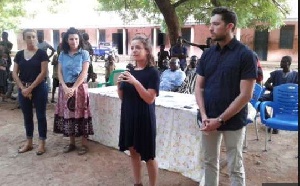 The farmers are required to pay GH
The farmers are required to pay GH
Compass 21, a not-for-profit organisation working in Ghana and US has commenced a five-day training on hydroponics for farmers at Sankana in the Nadowli-Kaleo District of Upper West Region.
Hydroponics is a technique of growing plants in water containing dissolved nutrients, which means after the training, beneficiary farmers would be enabled to grow plants in water without using of soil.
Ms Kianna Estenson, the leader of the Compass 21 team of trainers from US told Journalists during a community durbar to welcome the four-member team to the Sankana community.
Hydroponics is a new way of farming which allows communities with poor soil fertility to adopt and grow both plants and vegetables in water.
Apart from the hydroponics training, she said, the team would be holding business workshops on entrepreneurship to help people acquire basic business skills like starting a business, managing finances and sustainable income generation.
The farmers are required to pay GH¢20.00 in order to benefit from the training after which they would be given the necessary tools that would help sustain their businesses.
Mr Bernard Ambataayela Mornah, the National Chairman of People’s National Convention (PNC), and a native of Sankana who spoke on behalf of Sankana Naa, was happy about the training programme and commended Rev. Fr. Camillo Bonsuuri, the Founder and Chief Executive Officer (CEO) of Compass 21, for connecting the community to have training on the new technology.
The Sankana is an agrarian community but bush fires, erosions and repetitive tilling of the land has depleted the soil fertility and sparked low yields in recent years.
But Mr. Mornah said the community was blessed with water resources which could enable the people to put the technology into full use to reap its maximum benefits and full adoption of the technology would enable the people to move away from perennial dependence on seasonal and rain-fed agriculture to an all-year-round farming.
The training pioneers were urged to transfer the knowledge to the trainees to help benefit potential farmers in the community and beyond.
Rev. Fr. Bonsuuri said the organisation was formed to help tackle certain developmental challenges he raised concerning his community during his studies in US in 2010-2011.